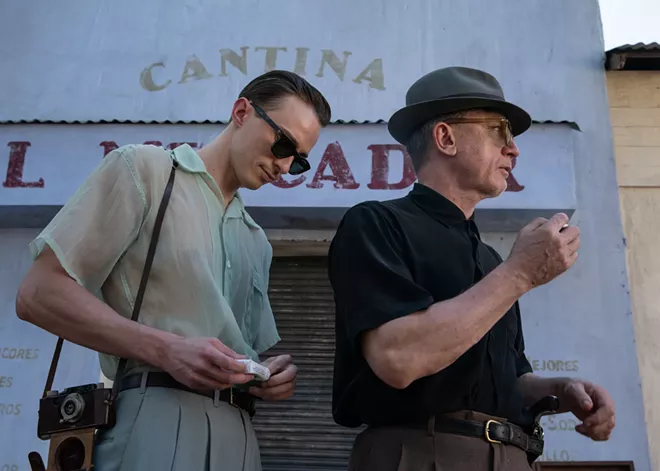As David Cronenberg proved with his 1991 film Naked Lunch, adapting the often abstract works of writer William S. Burroughs requires an equally abstract approach, rather than strict adherence to the elliptical text. Cronenberg made Naked Lunch into a surreal, terrifying journey full of his typical body horror, and director Luca Guadagnino eventually embraces the surreal in his new Burroughs adaptation Queer. But overall Queer is more sedate than Naked Lunch, toning down the abrasive personality of Burroughs’ literary alter ego for a story that is more tender and empathetic.
That’s not to say that Guadagnino and screenwriter Justin Kuritzkes have neutered Burroughs, though. Guadagnino has greater freedom to depict his characters’ sexuality, and there’s nothing timid or equivocating about Queer. Daniel Craig plays Burroughs stand-in William Lee, a dissolute American writer living in Mexico City in the 1950s, spending his days and nights drifting from bar to bar, picking up younger men for mostly anonymous sexual encounters. His apartment is filled with books and various tools of the writing trade, but he never seems to be working.
Lee describes himself as independently wealthy, and his main pastime aside from sex is taking cocaine and heroin. He finds a new fixation when he spots fellow expat Gene Allerton (Drew Starkey) from a distance and becomes immediately smitten, obsessed with seducing the fresh-faced photographer for something more than a one-night stand. Gene seems mostly ambivalent, which of course increases Lee’s desire, and even after the two finally end up in bed together, Gene remains aloof, never fully opening up to Lee.
That personal distance makes it tough to connect emotionally with Queer’s central relationship, and since Guadagnino focuses on a fairly straightforward romance for the first two-thirds of the movie, there isn’t much else to hold onto. Lee’s trysts with Gene are sometimes quite explicit, but they’re colder than the less graphic erotic teases in Guadagnino and Kuritzkes’ other 2024 film, Challengers. That movie spends much of its time on empty titillation, but it has a propulsive energy that’s the opposite of Queer’s languid, almost somnolent tone.
That quieter mode gives Guadagnino the chance to depict a more understated sense of longing, and there are a few moments in Queer that capture Lee’s inner desperation. Guadagnino superimposes opaque images of intimate caresses over early mundane interactions between Lee and Gene, in a simple but haunting illustration of Lee’s all-consuming need for love. Most of Queer is not nearly as subtle, and subtlety has never been one of Guadagnino’s strengths. Still, Queer has none of the swooning romantic qualities of Guadagnino’s most acclaimed film, Call Me by Your Name, which built its central love story with care and warmth.
When Queer takes a turn toward the bizarre in its final act, it remains stubbornly inert, even as Lee and Gene travel into the jungle to meet with an eccentric academic (Lesley Manville, overdoing the eccentricity) and experience an ayahuasca trip. At that point, Guadagnino expands the occasional hallucinatory interludes into the central focus, but there’s still little sense of the connection between Lee and Gene. Guadagnino made more effective use of grotesque imagery in his horror movies Suspiria and Bones and All, and Queer is neither unsettling nor particularly shocking.
Perhaps more so than any other actor who’s played James Bond, Craig has pushed himself into challenging, offbeat roles, and he plays Lee with a mix of weariness and sleaze, sharing a certain haggard demeanor with Naked Lunch star Peter Weller. Starkey makes Gene mostly inscrutable, which fits with the theme of emotional disconnection, but renders him more of an object to be attained than a fully realized character.
Queer’s most engaging performer is actually Jason Schwartzman as Lee’s fellow Mexico City dirtbag Joe Guidry, a chatty libertine who’s always cheerfully recounting all the things that have been stolen from him by men he hooks up with. His scenes with Lee have a casual friendliness that points to a more relaxed character study of gay culture in the movie’s specific time and place. That’s not what Burroughs was aiming for, though, and it’s not what Guadagnino aims for, either. He attempts to bring Burroughs’ drug-addled visions to life, but only ends up with an artificial approximation.
![]()
Queer
Rated R
Directed by Luca Guadagnino
Starring Daniel Craig, Drew Starkey

